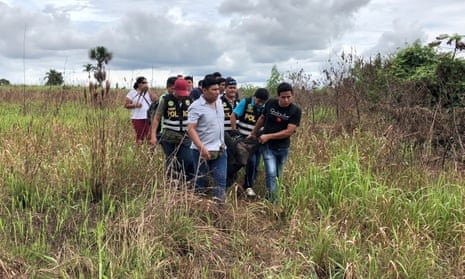A Peruvian judge has ordered the arrests of two men accused of lynching a Canadian man last week in a remote Amazonian village.
The Canadian, 41-year-old Sebastian Woodroffe, had been accused by villagers of murdering an indigenous medicine woman in the region of Ucayali and was killed in revenge by a mob, according to Peru’s interior ministry.
A minute-and-a-half-long mobile phone recording of the lynching, which was posted on Facebook, showed two men dragging Woodroffe by a noose around his neck as others looked on. His body was later found buried nearby.
Prosecutors have identified the two men and are working to determine who else took part in the lynching, according to the judicial ruling that ordered their arrests.
Less is known about the killing of Olivia Arevalo, 81, a revered shaman of the Shipibo-Conibo tribe who was shot dead near her home on Thursday.
Ricardo Jimenez, the head of a group of prosecutors in Ucayali, said no one witnessed Arevalo’s shooting, the murder weapon has not been found and a test for gunshot residue on Woodroffe’s body was expected to take 15 to 20 days.
Woodroffe had been Arevalo’s patient and her family claims he killed her because she refused to conduct a ritual in which the hallucinogenic Amazonian plant brew ayahuasca is used for healing and spiritual growth, said Jimenez.
Authorities are exploring several hypotheses related to Arevalo’s murder, including one in which another foreigner might have killed her over an unpaid debt, Jimenez said.
Arevalo’s death prompted outrage as it followed the unsolved killings of other indigenous people in the Amazon region who had faced threats for trying to protect their land.
Policing is scant over much of the Peruvian Andes and Amazon and villagers in far-flung provinces often punish accused criminals according to local customs.
Woodroffe moved to Ucayali after raising funds to help him learn more about plant medicine in Peru to become an addictions counsellor, according to the crowdfunding website Indiegogo.com, in which he listed his plan to spend 6,800 Canadian dollars (£3,800) at a Shipibo healing centre.
Ayahuasca has long been used by tribes in spiritual rituals and has fuelled a surge in Amazonian tourism in the past decade as its reputation for helping overcome addiction and trauma and providing spiritual insights has grown abroad.
Neither Woodroffe’s nor Arevalo’s family could be reached for comment.
Canada’s foreign affairs department said it was in touch with Peruvian officials. “We are aware of this case and actively seeking further information,” Global Affairs Canada said in a statement.
